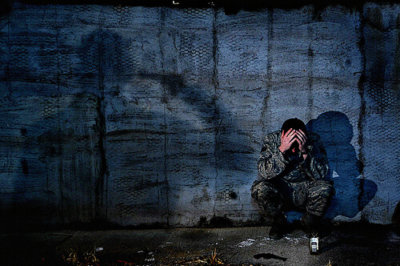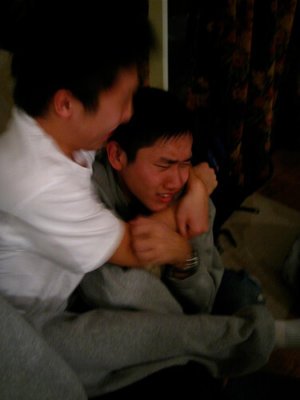Acute Stress Disorder vs PTSD vs Emotional Shock – Which One Do You Have?

By: MilitaryHealth
by Andrea M. Darcy
Have you experienced something overwhelming and frightening? It’s likely you will experience some form of psychological shock afterwards.
But when is shock normal and to be left to resolve itself, and when is emotional shock a real problem?
And what is the difference between acute stress disorder vs PTSD?
For a clear explanation on what exactly trauma is, read our article, “What is Psychological Trauma?“.
For a comprehensive list of psychological trauma symptoms, see our “Guide to PTSD and ASD“.
Diagnosing trauma – a tricky business?

By: Les Chatfield
Trauma is an individual’s unique response to a situation.
This means that while two people can experience the exact same traumatic event, one person will develop psychological trauma, and the other won’t.
It might seem logic that trauma would therefore be diagnosed based on someone’s symptoms.
But instead, it’s quite heavily based on looking at the event itself that caused the trauma.
Trauma is indeed the only mental health disorder in America’s well-known mental health reference guide, the DSM, to diagnose in such an objective over subjective way.
There are many mental health practitioners and organisations working to make the diagnosing of trauma more accessible and useful to all those who have symptoms. And yet the present definitions can sadly still mean that some people with symptoms don’t receive an official diagnosis.
What’s important when looking at the types of trauma below is to keep in mind that mental health ‘diagnoses’ are just labels designed by mental health care practitioners to communicate more efficiently about certain groups of people. And they are labels that are constantly updated, changed, or that even overlap with each other. So it’s not the exact diagnosis that matters. It’s knowing that you are struggling psychologically over an experience and need support, then doing your utmost to get it.
Emotional shock vs acute stress disorder vs PTSD
All three labels are psychological trauma. They all start from the same point of experiencing an event so overwhelming and you are psychologically unable to cope afterwards. And they all can cause the same cognitive, emotional, and physical symptoms like the ones mentioned above.
Emotional Shock
“Emotional shock” is not a clinical diagnosis, although psychologists may use the term. It’s rather just a popular term to refer to general psychological trauma. Sometimes people use it the term emotional shock when they are talking about acute stress disorder, which can make things confusing.

By: Elizabeth M
Emotional shock happens to most people after a difficult and unexpected experience, whether that is witnessing an accident, losing a loved one, being suddenly fired from your job, or having a very bad breakup.
Emotional shock can last up to a month or more. It can also be what is called ‘delayed shock’, meaning you might not have symptoms until up to a few days after the event.
The symptoms you are experiencing are your body and mind’s normal way of processing overwhelm.
Practice good self-care and get rest. Reach out to understanding friends and loved ones, or a counsellor if you need some unbiased support.
Emotional shock doesn’t require treatment. So a therapist won’t need to practice trauma techniques with you yet. Your mind needs time to process naturally . But they can certainly give you practical and emotional support.
If your emotional shock does not clear up on its own, and depending on what it was that caused the shock, you might actually be experiencing an acute stress reaction. It is also possible that your emotional shock has turned into post-traumatic shock disorder.
Acute Stress Reaction
Like emotional shock, acute stress reaction begins after a trauma, and can then develop into PTSD if it goes on for more than a month. It’s often referred to as the precursor or a variation of PTSD. But actually, not all cases of acute stress reaction become PTSD.
Acute stress reaction has all the same symptoms of PTSD, but also includes symptoms of dissociation. Dissociation is when you feel really detached from yourself and from reality. It can feel like you are slightly ‘out of your body’ watching yourself, like reality is far away, and your head can feel very blurry.

By: rocksee
If you have acute stress reaction and it doesn’t clear up after a month, but you have dissociation, would you have acute stress reaction, or PTSD? In such a case you might actually be diagnosed with longer form acute stress reaction.
Acute stress reaction has been found to respond well to cognitive behavioural therapy (CBT) and mindfulness-based therapies.
What’s the difference between emotional shock and acute stress reaction, then? If your emotional shock involves dissociation, you might be able to receive a diagnosis of acute stress reaction.
But it depends on what caused your emotional shock, and what country you are being diagnosed in.
The most recent edition of America’s DSM (version five), states that for a diagnosis of acute stress disorder the event that caused the trauma must be severe and traumatic. It must include either experiencing or witnessing “actual or threatened death, serious injury, or sexual violation“.
If you are in a country that rather relies on the World Health Organisation’s diagnostic manual the ICD-10, the criteria is similar, but then also includes, “an unusually sudden and threatening change in the social position and/or network of the individual, such as the loss of one’s family in a natural disaster.”
So, in general, acute stress disorder comes from very serious trauma, whereas emotional shock can rise from more common experiences like bereavement, betrayal, or sudden life changes.
Post traumatic stress disorder (PTSD)
As you might have guessed by now, PTSD is when you experience something so traumatic that your symptoms persist long-term. It is the most well-known and diagnosed form of psychological trauma. It can be diagnosed around six weeks after you experience a trauma.
You can also be diagnosed with ‘delayed onset PTSD’ if you only experience symptoms down the line.
Read our Guide to PTSD for more information, or our article on “PTSD in Children“.
Conclusion
Thankfully, nowadays it’s accepted more and more that PTSD can come from many types of traumatic experiences, can have a delayed onset, or even be cumulative (from a series of traumatic events, like repeat childhood abuse). So it’s easier than it once was to get a diagnosis.
That said, your diagnosis can depend on the country you are in, the medical referral guide your mental health practitioner is using, and who the practitioner is.
Again, the most important thing is to get the help you need. If not receiving a diagnosis affects your access to assisted help, read our article on “Free and Low Cost Counselling” for inspiration on where you might find support you can afford.
Harley Therapy connects you with counsellors and psychotherapists who work with PTSD and ASD in central London locations. Not in the UK? Consider online counselling.
Still have a question about acute stress disorder vs. PTSD? Ask below in our public comment box.





Hello; iam Milan age of 28.suffering from stress after faceing unusual tasks from people with me and their changing words with their own situations. I use medicine since 3 years .But some doctors decrease the size(mg) in sometime but some one never do it. I am confused about how long time I use it.
Hi Milan, we are not quite sure what you are asking. Are you confused about how long you will be on medication? Are you also talking to a therapist or counsellor, or just on medication? Medication can mask symptoms so you can cope but in order to change the symptoms and take less medication we have to work with a therapist to look at where the stress comes from and find ways to process repressed memories and emotions and think in different, more helpful ways.
I was in a physically and emotionally abusive marriage for four years, part of the time in Latin America. I managed to trick him and escape in Mexico and fled to Guatemala where I hid out in Guatemala City. He followed and found me. I was terrified of him. After I left for good and was back in the US I experienced dissociation for a year or more. I did not have flashbacks. I have still had problems with trust and self worth. Which is this? We are both US citizens.
Hi Elizabeth, it sounds terrifying just reading it. We can’t tell you which one it is, as it’s not based on what happened to you but all your symptoms over time, and we can’t diagnose someone we don’t know based on a little comment, not only would that be unprofessional but it would do you a disservice as you deserve a proper assessment and support. If we were to do an assessment it would also look at your life before this relationship, for example, what experiences set you up to choose an abusive relationship in the first place, as you might have already had trauma in place, a large majority of women who choose abusive relationships had traumatic childhoods and are engaging in what is called ‘trauma bonding’. What matters isn’t ‘what it is’ but what you are going to do now. How are you going to deal with this? We’d highly suggest you seek some form of counselling and support, even if that is just a support group for women survivors of domestic abuse, there are free support groups across America, google for one near you. Otherwise we have an article on how to find free to low cost counselling here http://bit.ly/lowcosttherapy.Best, HT.
Hello. I lost my friend late November last year and since then I haven’t been myself. I’m always afraid and I keep feeling weird. I’ve also seen various medical practitioners and they keep telling me it would fade off with time. I’m very confused on what to do as I don’t have money to pay for a therapist. Please What do I do next? I’m only 20years of age.
What I’ve discovered in my recovery journey is that it’s sooo not about the mind. Serious and complex trauma can get stuck in our bodies. Reactions become automated, leaving the suffer trapped in a loop of terror. Yes talking helps but I’m currently on a quest with a trusted expert to my body relearn that I am safe now.
Hi my name is chene it has been a year and 4 months since i have had an experience of my life that changed the way i dream and see people . I have had more nightmares than regular dreams and most of them are based on the event that happened and i feel traped in a loop of memories of the event . I am 17 years old at the moment and i dont know how to ask my dad for help bacause im to scared to go to sleep at night some night i dont close my eyes i just sit in the dark i dont even fall asleep i get up and go to school with no energy